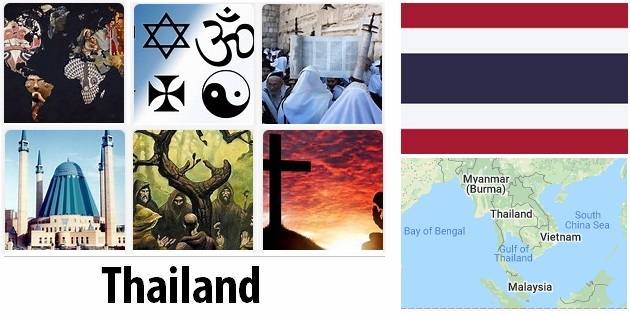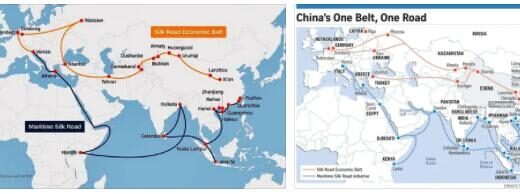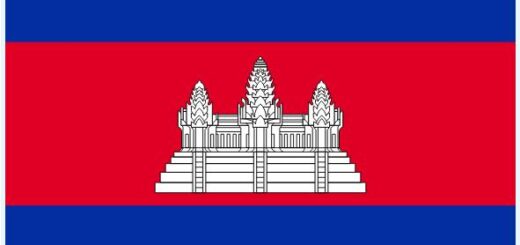Thailand Religion
A large majority of the population confess to Theravada Buddhism, which permeates social life and culture. Historically, the monarchy and the state have always had strong ties to religion. The king must be a Buddhist according to the constitution, but he must at the same time protect all religions.
In Thai theravada Buddhism, the quest to achieve the ultimate goal of life cycles, nirvana, is dimmed. Instead, you concentrate on achieving better conditions in this life or the next through good actions. It is considered a special merit to give food and other help to the monks. The monk being has great respect in society.
In the practice of religion there is a strong element of old folk belief. Adjacent to many buildings, you can see beautifully designed small houses that house the site’s protective spirits. Food and drink are exhibited at the spirit houses on special days. In every major village and town much of life revolves around the village ‘s wat, a combination of monastery and temple.
Among other religions is Islam, practiced by the Malays in the south, as well as by a few Thais in the Central Plains. A small minority of Vietnamese and Chinese are Christians. Among the Chinese there are also Confucians. In the mountain people, traditional religious belief and ancestral worship dominate.
- Countryaah: Population statistics for 2020 and next 30 years in Thailand, covering demographics, population graphs, and official data for growth rates, population density, and death rates.
2020
July
Schools are opened, nightlife is resurrected
July 1st
With a number of restrictions in place, schools are opened and clubs, karaoke bars, massage parlors and such places are allowed again. Business travelers from Japan, South Korea, Singapore and China as well as so-called medical tourists are allowed to visit the country again. At the same time, Thailand eases restrictions on entry for foreign nationals with work permits. The closure in connection with the corona pandemic has hit Thailand’s tourism industry hard. The country has 3,169 confirmed cases of covid-19 with 58 deaths from the viral disease.
May
Financial stimulus package
May 31st
The Legislative Parliament approves a nearly $ 60 billion economic stimulus package from the government. The money will help the country’s stalled economy to recover from the corona pandemic. Estimates fear that the tourism-dependent Thai economy may shrink by up to 7 percent in 2020. More than 17 billion of the amount will consist of support for farmers and workers in the informal market, as well as employees at massage parlors and bars. Investments are also made to stabilize markets and increase purchasing power as well as to “emergency preparedness in health care”. Most of the opposition in Parliament cast their votes in the vote on the stimulus package because they consider the measures to be too vague. The spread of the corona virus in Thailand has slowed down in recent weeks.
Society is slowly opening up
May 17
Shopping malls are allowed to reopen as part of a gradual return to an open society after Thailand was quarantined due to the corona pandemic. However, a number of restrictions, such as temperature controls and a limited number of visitors at a time, exist in stores. The spread of infection in the country has slowed down in recent weeks. At the time, Thailand had more than 3,000 confirmed cases of coronas infected people.
April
Rescue package against increased unemployment
April 19
King Maha Vajiralongkorn approves a number of laws that give the government the right to borrow more than $ 58 billion to go to public health care and job creation measures. Thailand risks losing around 10 million jobs due to the downturn in the tourism industry during the corona pandemic. An emergency permit exists in the country.
Nightly curfew
April 3
Nightly curfew is being introduced throughout Thailand to try to slow down the spread of the corona virus. Anyone who violates the ban can be sentenced to two years in prison. Exceptions are made for healthcare personnel, postal service and food and fuel transport.
March
An entry ban strikes against tourism
March 25th
Thailand is facing an entry ban in an attempt to curb the spread of the new corona virus, which has caused a pandemic. The ban applies to both air and sea transport and land transport. The decision is a blow to the country’s important tourism industry. Diplomats and returning Thai people with approved health declarations are exempt from the ban. At the same time, banning all kinds of public gatherings is introduced, with the exception of family gatherings such as weddings. Dissemination of fake news that can create fear can be punished by two years in prison. When the decisions are made, Thailand has 934 confirmed cases of coronary infection and four deaths.
Measures against coronary pandemic
March 18th
Thailand closes public places that gather large crowds, such as entertainment venues, sports arenas and schools. Examples are bars, cockfighting venues, boxing venues and nightclubs. The measures are an attempt to slow the spread of the new corona virus, which has caused a pandemic. The closures hit companies in the entertainment and tourism industries. The government announces that the celebration of the Buddhist New Year, Songkran, in April will not be a public holiday with leave as it usually does. The purpose is to make people travel less.
Regime critical street protest in Bangkok
the 13th of March
Hundreds of democracy supporters gather outside the parliament in Bangkok in the first regime-critical street protest in several years. They demand the resignation of the government and wear black t-shirts as a sign of sadness over the state of Thailand.
February
New future is forbidden
February 21st
The Constitutional Court decides to dissolve the opposition party New Future, which is sharply critical of both the government and the military. The court also bans party leader Thanathorn Juangroongruangkit and 15 other party leaders from being active in Thai politics for the next ten years. The reason for the decisions is that the Court considers that New Future financed the party business illegally when it received a six million dollar loan from Thanathorn Juangroongruangkit. New future 65 MPs will have 60 days to join other political parties. Around 500 followers gather on the same day outside New Future’s headquarters in Bangkok in a sympathetic expression.
About 30 dead in mass shooting
February 8
A soldier kills at least 29 people and injures another 60 in the city of Nakhon Ratchasima (Korat) as he holds hundreds of visitors in a mall for 18 hours with automatic weapons. He has stolen the weapons in a military weapons stockpile. The soldier is captured on surveillance cameras and shot a day later to death by a force of intervention. The motive for the shooting is unclear.
January
Peace talks about southern Thailand
January 22
Government representatives and the guerrilla movement BRN, which is fighting for autonomy in southern Thailand, are launching a series of rounds of talks after a six-year break in the peace process, reports the Bangkok Post.
New future is set in court
January 21st
The Constitutional Court frees New Future and its leaders from accusations that they would belong to an anti-religious organization and want to overthrow the monarchy. Party representatives call the legal case a blow to dissent.
Race against the regime
January 12
More than 10,000 people in Bangkok participate in a race that is in fact a manifestation against the regime. The runners demand that Prime Minister Prayut resign. The event is described in local media as one of the biggest public discontent since the 2014 military coup. The race is led by New Future leader Thanathorn Juangroongruangkit. Similar races are conducted simultaneously in Thailand, from Pattani in the south to Chiang Mai in the north. Demonstrations are also held in support of the regime, with fewer and older participants.




